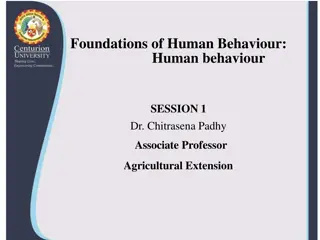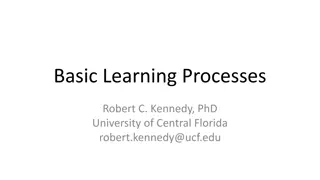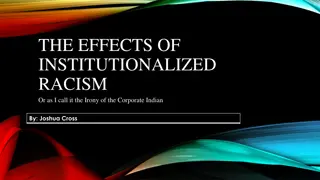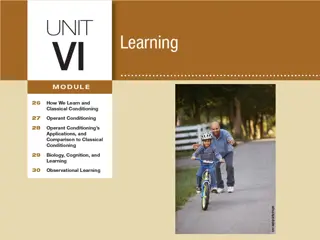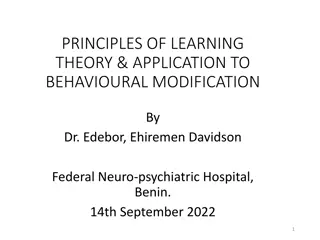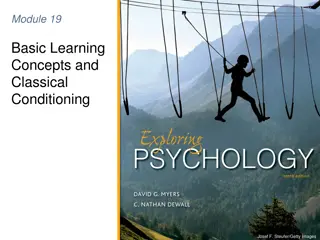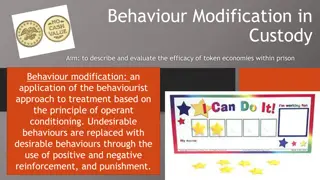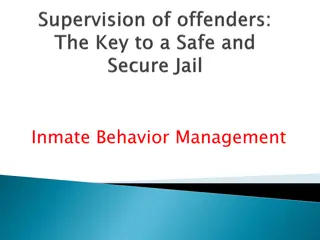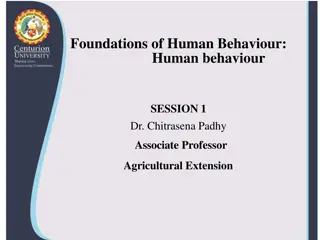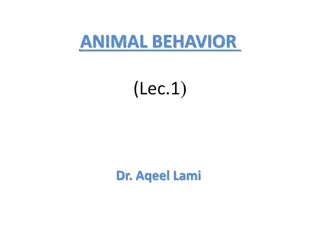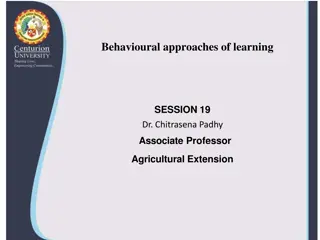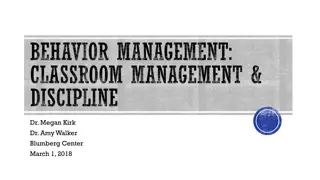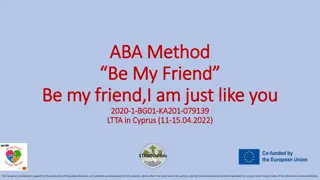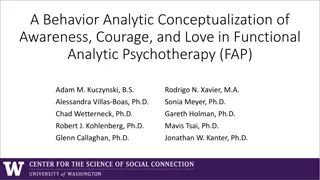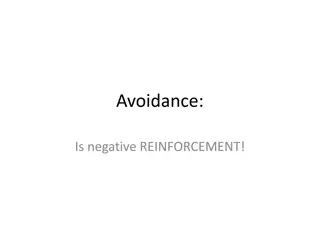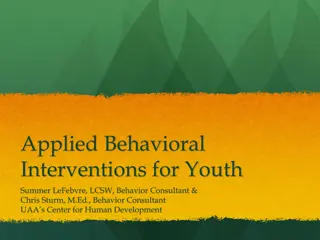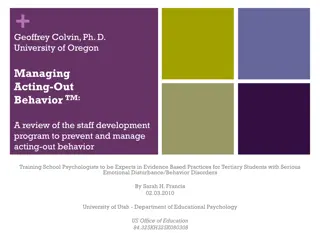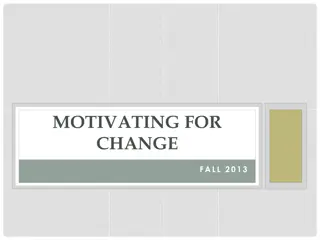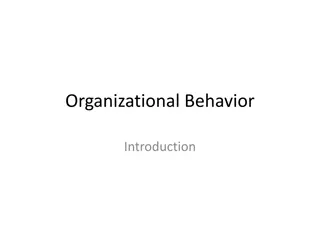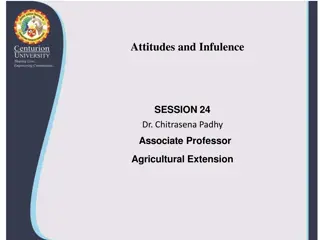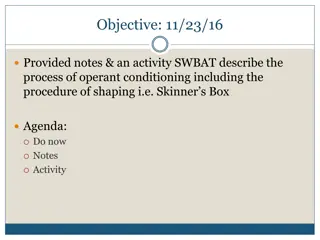Positive Behavior Support Interventions in Education
Learn about Tier 1 Positive Behavior Interventions & Supports (PBIS) developed by California State University and LA Unified School District. Explore evidence-based strategies like effective transitions, praise, choice-making, and establishing routines to promote positive behavior in students. Disco
1 views • 10 slides
Function Based Thinking
Function-based thinking in Missouri Schoolwide Positive Behavior Support, emphasizing data-based decision-making, mission clarity, and effective teaching practices. Understand how behavior is related to the environment and how environmental interventions play a key role in shaping expected behaviors
6 views • 27 slides
Addressing Predatory Behavior in the Fellowship
Predatory behavior, especially towards vulnerable members, is a concerning issue in the fellowship. This behavior includes unwelcome advances, exploitation of power dynamics, and institutional sexism. The discussion on predatory behavior necessitates honest dialogue and a united approach for a safer
3 views • 13 slides
Understanding Human Behavior: Foundations and Complexity
Human behavior encompasses the actions and interactions of individuals influenced by factors like genetics, culture, and situational contexts. It involves observable overt behaviors as well as hidden covert behaviors, with a dynamic interplay between individuals and their environments. Psychologists
8 views • 20 slides
GD Bart Puppy Test: Behavior Scoring System Overview
The GD Bart Puppy Test is a standardized behavioral scoring system designed for puppies at 8 weeks of age, focusing on 21 test components to predict success in canine behavior. Conducted by a team of 3 people, the test evaluates stress signals and responsiveness levels to various stimuli. Multiple e
6 views • 15 slides
Basic Learning Processes
Explore the essential vocabulary related to operant learning and reinforcement, including terms like automatic reinforcer, conditioned reinforcer, and positive reinforcement. Gain insights into theories such as drive-reduction theory and response-deprivation theory. Enhance your knowledge of behavio
3 views • 31 slides
Understanding the Role of Board-Certified Behavior Analysts in Supporting Students with Autism in PA School Programs
Pennsylvania Training and Technical Assistance Network (PaTTAN) plays a crucial role in supporting students with autism through the efforts of Board-Certified Behavior Analysts. The increasing number of students eligible for IEPs under the definition of autism necessitates skilled educators who can
0 views • 20 slides
Unveiling the Effects of Institutionalized Racism on Indigenous Peoples
Delve into the intricate web of institutionalized racism faced by Indigenous communities, exploring key concepts like covert racism versus operant racism, decolonization, and settler benefits. Learn how historical injustices, such as the Indian Act, continue to impact Indigenous autonomy and the fig
9 views • 21 slides
Understanding and Applying Operant Conditioning Principles
Explore the various applications of operant conditioning in different settings such as school, sports, work, and home. Discover how reinforcement and punishment techniques can be used for self-improvement and stress management. Learn about the key differences between operant and classical conditioni
0 views • 19 slides
Understanding Principles of Learning Theory and Behavioral Modification
Explore the principles of learning theory and its application in behavioral modification, highlighting concepts such as classical and operant conditioning. Learning, defined as a permanent change in behavior due to experience, is distinguished from performance. Discover how learning potential differ
2 views • 48 slides
Understanding Consumer Behavior in Marketing
The design of a marketing program starts with understanding consumer behavior. Consumers, as the end users, play a crucial role in shaping market trends. Producers seek insights into consumer personas, market behaviors, and influencing factors. Management focuses on the consequences of consumer beha
2 views • 26 slides
Understanding Psychology: The Science of Behavior and Mental Processes
Psychology is the scientific study of behavior and mental processes. Psychologists study both observable behavior and private mental processes. The primary goals of psychology are to describe, understand, predict, and control behavior. Different branches of psychology, such as applied psychology, cl
2 views • 29 slides
Examples of Classical and Operant Conditioning
Robert receiving a ticket for driving under the influence illustrates operant conditioning with negative punishments, while Chris being afraid of dogs after being bitten showcases classical conditioning with stimulus generalization. Jacob's joy from smelling his date's cologne demonstrates classical
1 views • 9 slides
Understanding Basic Learning Concepts and Classical Conditioning
Acquiring new information and behaviors through experience is known as learning. One common way we learn is through associative learning, where we connect certain events together. This process can take the form of classical conditioning, where stimuli evoke automatic responses, or operant conditioni
1 views • 14 slides
Token Economies and Behaviour Modification in Custody: Evaluating Efficacy
This article explores the application of token economies in prisons as a behaviour modification technique based on operant conditioning. Token economies involve exchanging tokens for desired behaviours, aiming to replace undesirable actions with positive reinforcement. The use of increments, consist
0 views • 19 slides
Understanding Behavioral Therapy in Psychotherapeutics
Behavioral therapy focuses on observable behavior and learning experiences to bring about change and enhance skills. It is used to treat a wide range of psychological disorders and is applicable in various fields such as developmental disabilities, education, clinical psychology, and rehabilitation.
0 views • 20 slides
Understanding Inmate Behavior Management in Correctional Settings
Inmate Behavior Management in correctional facilities involves supervising inmates, implementing corrective discipline, and fostering a fair and consistent environment. It emphasizes the importance of behavior management plans, identifying undesirable traits in supervision, and passing educational a
0 views • 19 slides
Understanding Human Behavior: Foundations and Factors
Human behavior is a multifaceted subject influenced by genetic makeup, culture, and individual values. It encompasses both overt actions and covert thoughts, a product of the individual and environmental factors. Psychologists study behavior from visible (overt) actions like playing football to inne
0 views • 20 slides
Understanding Punishment in Operant Behavior
Aversive stimuli can influence operant behavior through noncontingent punishment, as seen in conditioned emotional responses like conditioned suppression. The threat of upcoming aversive events can reduce responding, highlighting the importance of conditioned emotional responses. Punishment operates
0 views • 27 slides
Understanding Superstitious Behavior Through Operant Conditioning Experiments
Explore the phenomenon of superstitious behavior through the lens of operant conditioning experiments conducted by behaviorists like B.F. Skinner. Discover how noncontingent reinforcement can lead to the development of superstitious beliefs in both humans and animals, as demonstrated in various stud
0 views • 8 slides
Understanding Normal and Abnormal Behavior: Perspectives and Definitions
Normal behavior varies from person to person and society, influenced by individual preferences and societal norms. Abnormal behavior is characterized by an inability to function effectively or personal discomfort. The concept of normality and abnormality in psychology raises complex questions about
2 views • 8 slides
Understanding Reinforcement and Association in Behavioral Psychology
This content delves into the concepts of reinforcement, association, and operant conditioning in behavioral psychology. It discusses how actions are influenced by rewards and consequences, the differences between association and reinforcement, and classical conditioning models like the Rescorla-Wagn
0 views • 8 slides
Understanding Human Behavior: Insights for Social Workers
This material delves into the intricacies of human behavior, exploring factors influencing behavior such as heredity, environment, intelligence, needs, and motives. It covers the concept of human behavior, stages in life from conception to old age, and theories of human development by eminent psycho
2 views • 71 slides
Understanding Animal Behavior and Ecology
Animal behavior encompasses a range of activities such as feeding, breeding, and social interactions. Ethology focuses on studying behavior in natural environments, while behavioral ecology examines ecological aspects like predator-prey interactions. Sociobiology delves into the evolution of social
3 views • 5 slides
Understanding Behavioral Approaches of Learning
The behavioral approach to learning examines how observable behaviors are influenced by environmental factors. It emphasizes the role of stimuli and reinforcement in shaping behavior through classical and operant conditioning. Classical conditioning, illustrated by Pavlov's dogs, involves associatio
0 views • 9 slides
Understanding Behavior Management in Classroom Settings
Explore the essential topics of behavior management, classroom strategies, and discipline in educational settings. Delve into the functions of behavior, impact of trauma on learning, and effective management techniques. Learn how to identify underlying reasons for student behaviors, discuss behavior
0 views • 76 slides
Targeting Emotions to Facilitate Behavior Change in Older Adults
Efforts in changing health behavior have traditionally focused on social and cognitive factors, but recent evidence highlights the importance of affective states in decision-making and behavior change. Janey Peterson discusses the role of emotions in achieving and sustaining behavior change to benef
0 views • 11 slides
Introduction to Applied Behavior Analysis (ABA): Basics and Applications
ABA is a systematic approach that aims to improve behaviors through reinforcement strategies, focusing on operant conditioning principles. It targets various groups like toddlers, school-aged children, teens, and young adults. ABA is widely used for disorders such as substance use disorder, eating d
0 views • 30 slides
Understanding Functional Analytic Psychotherapy (FAP) Concepts
Delve into the Behavior Analytic Conceptualization of Awareness, Courage, and Love in Functional Analytic Psychotherapy (FAP). Explore the principles of FAP, including clinically relevant behaviors, the therapeutic relationship, and the five rules guiding the practice. Discover how FAP targets behav
0 views • 21 slides
Grading Criteria for Effort and Behavior in Educational Reporting
Effort and behavior in educational settings are evaluated based on criteria ranging from Excellent to Causing Concern. Pupils demonstrating excellent behavior show respect, responsibility, and positive engagement in learning. Those with good behavior exhibit cooperation and respect for others, albei
0 views • 9 slides
Understanding Avoidance Behavior and Its Theories
Avoidance behavior involves negative reinforcement to increase the frequency of operant responses, not punishment. Different types of avoidance tests, such as discriminated avoidance and shuttle avoidance, are used to study negative reinforcement. The Two-Factor Theory of avoidance conditioning expl
0 views • 61 slides
Basics of Learning: Classical and Operant Conditioning Overview
Types of learning include classical conditioning, operant conditioning, and observational learning. Classical conditioning involves pairing a neutral stimulus with a meaningful one to elicit a response. Operant conditioning focuses on how consequences influence behavior. Terminology like UCS, UCR, N
0 views • 66 slides
Understanding Applied Behavior Analysis (ABA) for Youth Interventions
Applied Behavior Analysis (ABA) is a science focusing on improving human behavior by increasing desired behaviors, teaching new skills, and generalizing behaviors. ABA emphasizes observable behaviors, measurement of behavior change, and the use of interventions in various settings like classrooms an
0 views • 25 slides
PBIS Expectations and Behavior Flowchart
The PBIS flowchart outlines behavior expectations and interventions for minor and major incidents in a school setting. It covers disrespectful behavior, disruption, defiance, property damage, theft, possession of weapons, and more. The flowchart guides teachers and staff on managing and addressing s
0 views • 6 slides
Managing Acting-Out Behavior: A Staff Development Program Review
This review discusses a staff development program created by Geoffrey Colvin, Ph.D., from the University of Oregon, focusing on preventing and managing acting-out behavior in students with emotional disturbance or behavior disorders. The program includes video presentations, strategies for behavior
0 views • 22 slides
Understanding Motivation and Change in Fall 2013
Delve into the various aspects of motivation and change in Fall 2013, exploring theories like Achievement Motivation Theory, Self-Determination Theory, Operant Conditioning, and Motivational Interviewing. Discover the complexities of motivating individuals and draw inspiration from historical events
0 views • 130 slides
Understanding Organizational Behavior and Individual Behavior
Organizational Behavior (OB) is a multidisciplinary field that combines knowledge from various disciplines to study and manage organizations effectively. It emphasizes the application of this knowledge to enhance organizational effectiveness and the well-being of participants. OB is a useful concept
0 views • 38 slides
Function-Based Behavior Support Plans: A Comprehensive Guide
Explore the process of developing Function-Based Behavior Support Plans (BSP) using Functional Behavioral Assessment (FBA). Understand the concepts of function and functional behavior assessment, learn how FBA/BSP fits within a multi-tiered support system, and practice developing BSP for students. D
0 views • 74 slides
Understanding Attitudes and Influence in Behavior Formation
Attitudes are influenced by various factors such as experience, social roles, conditioning, and observation. They can be learned through classical and operant conditioning and by observing others. However, attitudes do not always align with behavior. Factors influencing attitude strength include exp
0 views • 16 slides
Understanding Operant Conditioning: The Process and Importance
Operant conditioning is a type of learning where behavior is influenced by its consequences. This process, famously studied by B.F. Skinner, involves shaping behavior through reinforcement or punishment. By understanding how behaviors are reinforced or diminished, we can better comprehend how volunt
0 views • 36 slides



